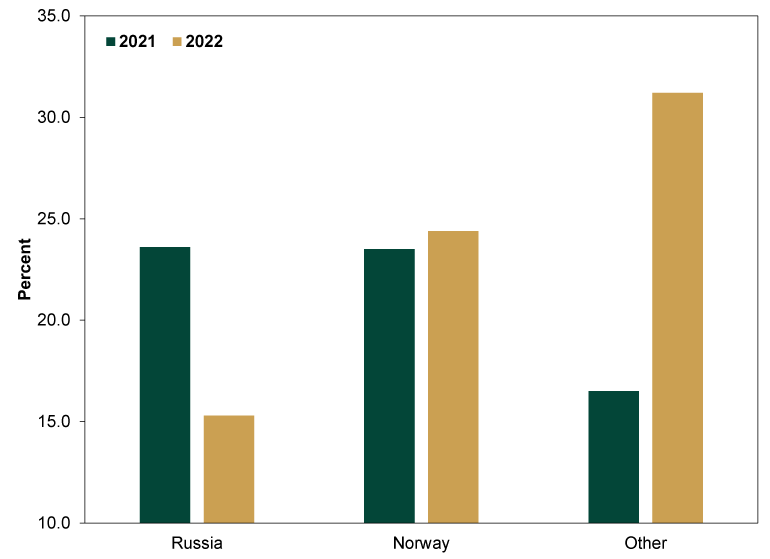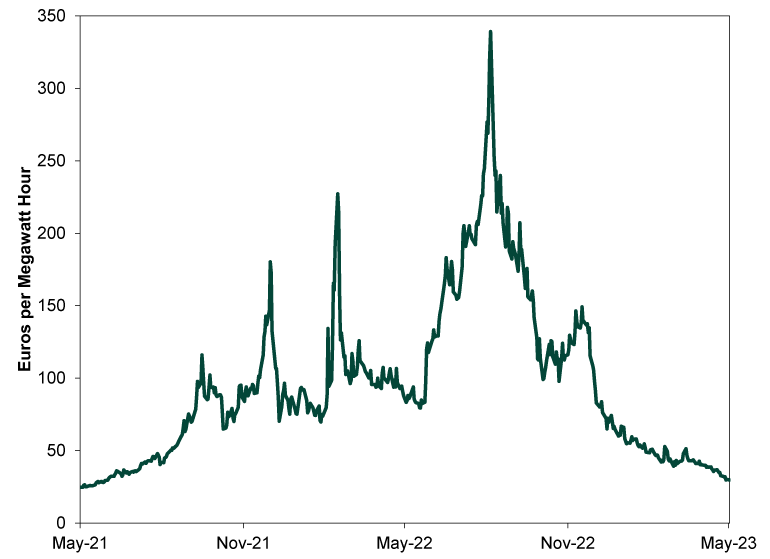Personal Wealth Management / Market Analysis
The European Energy Improvements Stocks Anticipated
Energy prices have returned to pre-crisis levels—a development markets anticipated first.
Economic reality exceeding fears is the primary force underlying global stocks’ rally since last October, in our view. One prominent example: Europe’s energy situation. Since mid-2021, the Continent has faced a sequence of energy issues, ranging from a dearth of wind early—which forced utilities to shift to natural gas—and then, of course, its dependence on Russian energy contributing to ginormous price spikes and worries of rationing and blackouts. Energy costs hit eye-watering levels: European natural gas prices registered an all-time high in October 2021—and would triple in under a year—while global oil prices rose to their highest levels in more than a decade.[i]
These developments convinced most experts Continental energy shortages would drive a deep recession. Yet as we approach summer 2023—and with European gas prices down to their lowest level in two years—the energy situation is looking decidedly less dire. To us, this is a shining example of reality turning out better than feared, which has propelled a strong eurozone rally since last fall. Conditions still aren’t pristine—but they needn’t be for stocks, a key lesson to keep in mind.
A big reason reality has turned out better than many thought: Russia lost its energy leverage over Europe, as the Continent found other sources of natural gas. As Exhibit 1 shows, the EU has been shifting away from Russian gas, finding supply from other nations, including Norway, America, Algeria and Qatar. (Exhibit 1)
Exhibit 1: Extra-EU Imports of Natural Gas, 2021 - 2022

Source: Eurostat, as of 5/3/2023. Origin of EU natural gas imports, 2021 and 2022. “Other” refers to the United States, Algeria, Qatar and the United Kingdom.
EU nations have also been rapidly developing their LNG infrastructure to reduce Russian gas imports. In under a year, Germany permitted, built and is now operating three floating liquefied natural gas (LNG) terminals.[ii] The German government now expects to slow development of more terminals since gas supply is no longer a pressing problem.[iii]
Granted, this transition hasn’t been easy or painless. Businesses and households have struggled with higher energy prices even with government aid. Some factories have reduced output, temporarily closed and/or resorted to layoffs. But from an investing perspective, forecasts of a deep, energy-driven European recession have yet to manifest—and now energy prices have round-tripped to pre-crisis levels. (Exhibit 2)
Exhibit 2: European Natural Gas Prices Are Back to 2021 Levels

Source: FactSet, as of 5/22/2023. Dutch TTF natural gas price in euros, 5/21/2021 – 5/22/2023.
This improvement isn’t news to forward-looking stocks, though. From their November 2021 high in euros (to avoid strong US dollar skew) to their September 2022 low, eurozone stocks fell -24.8% while German stocks slipped -30.6%—both worse than global stocks’ -12.4% over the same period.[iv] To us, Europe’s outsized drop reflected stocks’ pricing in the energy crisis and its related fallout—particularly on the German economy, whose large chemicals industry is dependent on natural gas. In our view, stocks’ behavior is consistent with the pre-pricing of an economic downturn—which they started doing in late 2021. Likewise, markets began recovering before official economic data confirmed improvement. Fittingly, Germany’s DAX index hit a record high last week, just as natural gas prices returned to pre-crisis levels. Coincidence, yes, but a nice reminder stocks don’t wait for things to fully improve.
Now it appears people are catching up to what markets already moved on, as evidenced by the European Commission’s (EC) latest projections for the EU economy and member nations. In its Autumn 2022 Forecast, the EC predicted EU GDP would contract in Q4 2022 and Q1 2023—with a full-year 2023 GDP projection of 0.3% growth—and anticipated a -0.6% annual contraction for Germany. But in its Spring 2023 forecast released last week, the EC acknowledged the latest data were better than they thought. Now the outfit projects an EU GDP annual expansion of 1.0% and thinks German GDP will grow 0.7% rather than contract this year. Interestingly, the EC’s revision echoed the Bank of England’s upgrade to UK growth expectations, as better-than-anticipated data also forced policymakers there to update their estimates.
Now, this doesn’t mean economic conditions are great. Inflation, while slowing, is still well above pre-2021 rates. Heavy industry remains in a soft patch: Eurozone March industrial production contracted -4.1% m/m while the region’s manufacturing purchasing managers’ indexes (PMIs) have registered sub-50 readings since July last year—a sign more businesses are contracting than expanding.[v] That is a headwind, though the services sector is generally holding up better, and it is the majority of eurozone output.
Looking ahead, we don’t dismiss the possibility of a eurozone recession later this year, and we are keeping a close eye on lending developments, as less capital moving throughout the economy can weigh on growth. But for investors, remember stocks move most on the gap between expectations and reality—and the former remain quite low. Consider: Energy fears haven’t gone away even after recent improvement, and some economists think recession looms next winter, as competition with other regions for natural gas could lead to European shortages. To us that suggests pessimism remains prevalent—and that the wall of worry bull markets climb remains high.
[i] Source: FactSet, as of 5/22/2023.
[ii] “Germany Scales Down LNG Terminal Plans as Supply Crisis Eases,” Markus Wacket and Riham Alkousaa, Reuters, 5/15/2023.
[iii] Ibid.
[iv] Source: FactSet, as of 5/22/2023. MSCI EMU Index, MSCI Germany Index and MSCI World Index returns with net dividends, in euros, 11/17/2021 – 9/29/2022.
[v] Source: S&P Global, as of 5/23/2023. Statement based on May preliminary eurozone PMIs.
If you would like to contact the editors responsible for this article, please message MarketMinder directly.
*The content contained in this article represents only the opinions and viewpoints of the Fisher Investments editorial staff.
Get a weekly roundup of our market insights
Sign up for our weekly e-mail newsletter.

You Imagine Your Future. We Help You Get There.
Are you ready to start your journey to a better financial future?

Where Might the Market Go Next?
Confidently tackle the market’s ups and downs with independent research and analysis that tells you where we think stocks are headed—and why.





